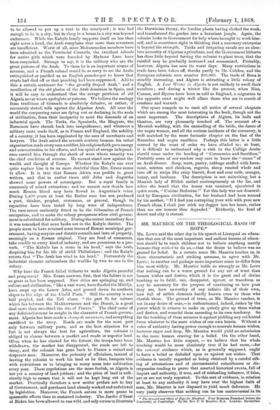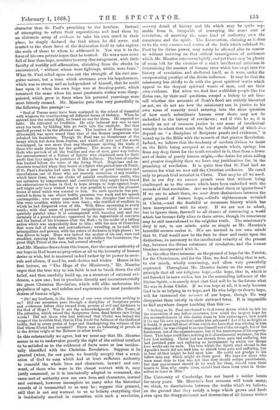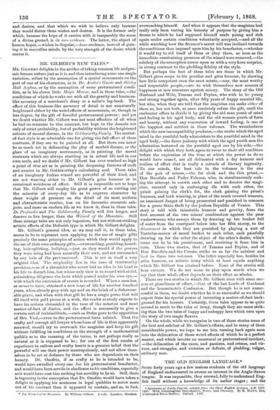MR. MAURICE ON THE THEOLOGICAL BASIS OF HOPE.*
MR. LowE said the other day in his speech at Liverpool on educa- tion that one of the most important and earliest lessons of educa- tion should be to teach children not to believe anything merely because they wished to do so,—that the desire to believe was no ground for belief. In a certain sense Mr. Maurice teaches us, in these characteristic and striking sermons, to agree with Mr. Lowe ; in another and perhaps more important sense to differ from him most widely. Mr. Maurice holds as strongly as Mr. Lowe that nothing can be a worse ground for any act of trust than human wishes and desires, which it is the great end of divine teaching so to fulfil, use, disappoint, uproot, or transform as may be necessary for the purpose of convincing us how poor they are, how unworthy of any infinite life of their own, how full of selfish elements hardly known even to those who cherish them. The ground of trust, as Mr. Maurice teaches, is not in any desire of ours,—is authenticated, indeed, rather by the power which it evinces to make us quietly give up these wishes and desires, and remodel them according to its own tendency. So far the teaching of these sermons is against yielding any evidential force whatever to the mere wishes of our own hearts. Without a voice of authority having power enough to overrule human wishes, however eager and deep, Mr. Maurice would yield no submission to the mere human craving for a belief. On the other hand, Mr. Maurice has little respect, — we believe that his whole teaching would be more absolutely true if he had more,—for the external evidence which, as is generally supposed, ought to force a belief or disbelief upon us against our wishes. That evidence is usually regarded as being obtained by a careful sift- ing of attestations and of circumstantial coincidences or dis- crepancies tending to prove that asserted historical events, full of import and authority, if true, and of misleading influence, if false, are or are not truly reported. To this sort of evidence, in relation at least to any authority it may have over the highest faith of man, Mr. Maurice is not disposed to yield much deference. He very justly observes that nothing can be less controversial in its ■ The Ground and ()hied of Hope for Mankind. Four Sermons Preached before the University of Cambridge. By the Rev. F. D. Maurice, M.A. London: Macmillan. character than St. Paul's preaching to the heathen. Instead of attempting to refute their superstitions and lead them by an elaborate array of evidence to take his own creed in their place, he simply declared the God whom he did serve, and trusted to the sheer force of the declaration itself to take captive the souls of those to whom he addressed it. Nor was it to the force of his own private hopes that he trusted. He was a man more full of fear than hope, sensitive to every discouragement, with little faculty of worldly self-affirmation, shrinking from the checks he encountered, " without whom were fightings, within were fears." What St. Paul relied upon was not the strength of his own san- guine nature, but a trust which overcame even his hopelessness, which was so strong and so independent of himself, that he could lean upon it when his own hope was at freezing-point, which remained the same when his most passionate wishes were disap- pointed, which grew in force when his personal yearnings were most bitterly crossed. Mr. Maurice puts this very powerfully in the following fine passage :- " Saul of Tarsus must have been equipped in the school of Gamaliel with weapons for overthrowing all different forms of idolatry. When he entered into the actual fight, he found no use for them. He exposed no fable. He ridiculed no tradition. He only induced any one to cast away his torch by bidding him go forth into the sunlight. But that method proved to be the effectual one. The instinct of Demetrius the silversmith was more sound than that of the Roman magistrate who rebuked his fanaticism. Though St. Paul was no blasphemer of the image which fell down from Jupiter, and which all Asia and the world worshipped, he was more than any blasphemer spoiling the trade of those who made shrines for the goddess. The dream of a Father of Gods who partook of all the frailties and sins of mon, gave way before the announcement of a Father of Spirits who chastened men for their profit that they might be partakers of His holiness. The hum of oracles was hushed before the voice of the living Word. Magicians and en- chanters trembled when they heard of a Spirit who guided into all Truth. If St. Paul's disciples had seen in him a man of great buoyancy and cheerfulness, one of those who are scarcely conscious of any troubles which beset them, who can shake off painful recollections easily, who are optimists by temperament and constitution, they might have heard his exhortations to hope in God, to hope always, to hope against hope, and might only have wished that it was possible to attain the pleasant frame of mind which was natural to him. No such spectacle was pre- sented to them in one whose bodily presence was weak and his speech contemptible ; who never concealed it from his disciples that without him were troubles, within him were fears ; who testified of conflicts in which he had despaired even of life. With fibres answering to every touch; with that sense of personal insignificance which is most ex- quisitely painful when it is accompanied with burning zeal and the certainty of a grand vocation ; oppressed by the ingratitude of converts and the hatred of his kinsmen after the flesh ; in the midst of a falling nation which was unspeakably dear to him; with the care of Churches that were full of strife and contradictions ; wrestling, as he said, with principalities and powers, with the rulers of darkness in high places ; he was driven to hope. Hope was indeed the anchor of his soul, sure and steadfast, entering into that within the veil whither tho forerunner, the great High Priest of the race, had entered already."
And Mr. Maurice draws from this lesson, that the moral authority of our hope in God bears no proportion at all to the intensity of human desire or wish, but is measured indeed rather by its power to over- rule and silence, if need be, such desires and wishes. Hence in his first lecture, on " The Hope of the Missionary," Mr. Maurice urges that the true way to win faith is not to break down the old belief, and then carefully build up, on a structure of external evi- dences, a new one ; but to proclaim directly and uucontroversially the great Christian Revelation, which will alike undermine the prejudices of ages, and subdue and regenerate the most passionate desires of human origin.
" Oh ! my brethren, is the history of our own conversion nothing to us ? Did our ancestors pass through a discipline of Scripture proofs and evidences before they turned from powers of evil and darkness to the God of Hope ? Was it not the acknowledgment of His Name, of His salvation, which raised the Scriptures from dead letters into living words ? Did not those who had believed that Christ was indeed the image of the invisible God, that in Him d welt the fullness of the Godhead bodily, find in every psalm of hope and thanksgiving the witness of the God whom Christ had revealed? There was no balancing of proofs as to the divine origin of the Hebrew or other books."
In this substantially we agree, but we must say that Mr. Maurice seems to us to undervalue greatly the right of the critical intellect to be satisfied as to the evidences of facts more or leas inciden- tally identified with the Christian Revelation. Suppose it be granted (what, for our parts, we heartily accept) that a revel- ation of God to man which had at least sufficient authority to remould the whole lives and characters, inward and out- ward, of those who were in the closest contact with it, may justly command, as it is intrinsically adapted to command, the same sort of authority over our own lives and characters, inward and outward, however incomplete on many sides the historical records of it transmitted to us may be ; suppose this granted, still that is not any warrant to us to believe everything that is incidentally asserted in connection with such a revelation, —every detail of history and life which may be quite sep- arable from it, incapable of conveying the same sort of revelation, of asserting the same kind of authority over the conscience and the spirit. The Incarnation, claiming as it does to be the very essence and centre of the faith which subdued St.
Paul by its divine power, may surely be allowed also to master us without insisting on that critical investigation of evidences which Mr. Maurice esteems so lightly, and yet there may be plenty of room left for the exercise of a strict intellectual criticism in determining the amount of human error which has crept into the history of revelation, and sheltered itself, as it were, under the overpowering prestige of the divine influence. It may be that the missionary has chiefly to do with the great spiritual truths which appeal to the deepest spiritual wants of man, and are their own evidence. But when we find that a childish people like the Zulus can, by their naif questions, compel a bishop to ask him- self whether the accounts of Noah's flood are strictly historical or not, we do not see how the missionary can in justice to his own sense of veracity avoid entering into the nicer question of how much subordinate human error there may not be embodied in the history of revelation ; and if this be so, it is
merely an act of common justice to our sense of intellectual veracity to admit that much the belief or disbelief of which does
depend on " a discipline of Scripture proofs and evidences," is
mixed up in the Bible with the records of that greater Revelation. Indeed, we believe that the tendency of modern divines to insist on the Bible being accepted as an organic whole, springs less from any deep thirst for the truth revealed in it, than from a lower
sort of desire of purely human origin,—the desire for plain sailing and greater simplicity than we have any justification for, in the preaching of revelation. It is quite true that St. Paul had no occasion for what we now call the Christian evidences. He cared
only to preach God revealed in Christ. That may be all we need. But in our day we cannot preach even that without being challenged as to the errors which have been embodied with the records of that revelation. Are we to admit them or ignore them? If we are to admit them, we must draw distinctions between the
great ground of human hope,—God's righteousness revealed in Christ,—and the doubtful or erroneous history which has been incorporated with its story. If we are not to admit, but to ignore them, farewell to all chance of convincing a would which has become fully alive to these errors, though its conscience may be still unawakened to the mightier truth. The missionary's duty is not, to our minds, quite so simple as Mr. Maurice's beautiful sermon makes it. We are assured in our own minds that St. Paul would now be the first to draw and insist upon the distinction, so necessary to the intellectual veracity of the present day, between the divine substance of revelation, and the human blunders incorporated with it.
In the other three sermons; on the ground of hope for the Patriot, for the Churchman, and for the Man, we find nothing that is not, to our minds, wholly convincing, and often very powerfully
expressed. Throughout Mr. Maurice insists on the same great principle that all our religious hope,—the hope, that is, which is
not founded in mere wishes, but in the controlling influence of the Divine Spirit, —is merely trust that God will be in the future what He was in Jesus Christ. If we can hope at all, it is only because God is in us helping us to hope, and He who helps us thus to hope, will far transcend the measure of our hopes, though He may
disappoint them utterly in their outward form. It is impossible to find anywhere deeper teaching than this :-
" So long as St. Paul attributed to God every desire which he felt for the renovation of any fellow-creatures, how could the largest hope for the accomplishment of this desire seem to him extravagant, how could it (to use his own expression) make him ashamed ? Let it be as bright as it would, it must fall short of that which the Love that was stirring in him demanded ; he was obliged to accuse himself not of the strength, but of the feebleness, not of the expansiveness, but of the narrowness of his expecta- tions. This hope could have nothing in it of sentimental weakness, for this love had nothing. Christ had not shrunk from pain and suffering, but had justified pain and suffering as instruments by which the divine love works out its ends. The love which the Spirit shed abroad in the Apostle's heart did not lead him to shrink from pain and suffering, but to bear all that might be laid upon him. He could not grudge to his fellow men any which might do them good. His hope for those who were most dear to him was not that they should escape punishment, but that punishment should do its work for them, should turn their hearts to Him who smote them, should lead them from trust in them- selves to trust in Him."
The University of Cambridge has not heard a nobler lesson for many years. Mr. Maurice's four sermons will teach many, we think, to discriminate between the truths which we believe, on the ground that they satisfy a hope which grows and feeds even upon the disappointment and destruction of all human wishes
and desires, and that which we wish to believe only because they would flatter those wishes and desires. It is the former only which, because the hope of it carries with it inseparably the sense of a divine ground, is its own evidence. The latter, the object of human hopes,—wishes in disguise,—loses credence, instead of gain- ing it in masculine minds, by the very strength of the desire which craves it.




































 Previous page
Previous page